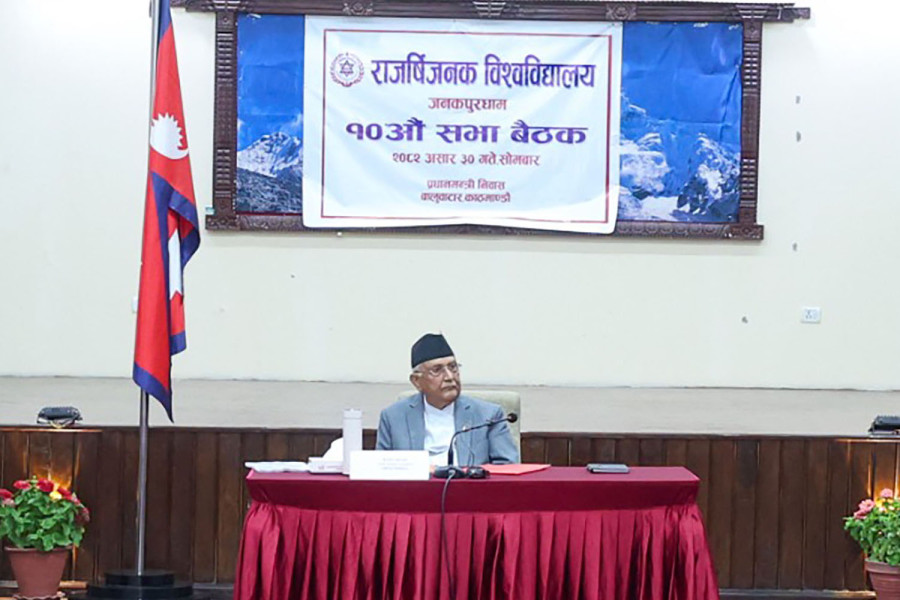National
Five law colleges teach first semester flouting Supreme Court order
With the final court verdict pending, around 200 students who enrolled in the law colleges in question face an uncertain future.
Ellie Davis
Anishma Gubhaju recently finished her first semester as a law student at Mount View International College, coming first in her class of 40 students. But her studies, along with other students at BALLB programmes affiliated with Rajashri Janak University, violate an interim order that the Supreme Court issued last September. The order had instructed all law colleges affiliated with RJU to not admit students and teach until a full court hearing could take place.
“Since [the law colleges] have taken admission, they are in violation of the Supreme Court,” an officer at the Nepal Bar Council told the Post.
With the legal case still pending, Gubhaju and the roughly 200 other law students who have completed their first semester of their BALLB programmes face uncertainty regarding whether the Supreme Court will determine their legal education to be invalid.
Last August, Rajarshi Janak University issued affiliations to 15 new law colleges, sparking an ongoing legal battle. Students at the Kathmandu University School of Law filed a writ petition in September, claiming that RJU and the affiliated law colleges did not meet the quality control regulations set forth by the Nepal Bar Council and the Nepal Legal Education Regulation Act. RJU, they have argued, failed to ensure that the new law colleges had enough books and qualified teachers prior to granting the affiliations.
The student plaintiffs claim that instead of prioritising quality education, the colleges saw legal education as business.
“They are enrolling anyone who can pay money,” Kathmandu University School of Law student and lawsuit plaintiff Sujal Pokharel told the Post. “These colleges are not providing proper education. They are not concerned about the future of the students.”
Leaders of the law colleges, however, argue that students in Nepal will benefit from having more law school options.
“If there is healthy competition, students will benefit,” Director of Sann International College Karna Bahadur Shahi said. Sann International College, which runs BALLB programme under the RJU, recently finished teaching the first semester of the programme. “There was no fair competition,” Shahi added. “We’ve come in and we are giving healthy competition.”
The Supreme Court initially sided with the students, issuing an interim order on September 26 that barred the affiliated law colleges from accepting students until a full hearing took place. Later, the Supreme Court tasked the Nepal Bar Council with assessing the 15 law colleges. On December 25, the Council reported that six of the 15 law colleges met the minimum criteria to begin teaching and provided the six colleges temporary recognition. The Council gave the colleges one year to fulfill the remaining requirements by taking steps such as increasing the number of classes offered and the number of books available to students.
Still, according to the Council, it did not give approval for the law colleges to begin teaching.
“We did not say that you can admit students,” a Nepal Bar Council representative told the Post. “We are waiting for a final decision of the Supreme Court.”
Despite a Supreme Court Order on December 31 that extended the ban on the colleges admitting students, five of the six law colleges that received temporary recognition from the Council have taught their first semester of classes and completed their first round of exams in May. These colleges include Mount View Institute and Sann International College, as well as Birgunj School of Law, Megha College of Law, and Queens College of Law.
Megha College of Law and Queens College of Law denied the Post’s request for comment, and Rajashri Janak University and Birgunj School of Law did not respond to requests for comment.
Shahi, who is also the former president of the Nepal National Private Boarding Schools’ Association, maintains that Sann International College has received approval to operate its BALLB programme, based on the evaluation of the Nepal Bar Council. Shahi sees the lawsuit against the RJU-affiliated colleges as motivated by the established law colleges in Nepal that hope to maintain control over the legal education market.
“This is an entire scam—hidden interests have filed the case,” he said. “They are not working for the quality of law education, they are working for hegemony of education.”
The student plaintiffs have previously denied that they are working for or have received any payment from established law colleges, and have stated that officials at Kathmandu University refused to get involved in the lawsuit when the students asked for support.
Licensed advocate Prabhat Singh, one of the plaintiffs and a recent graduate of Kathmandu University School of Law, says his goal in the lawsuit is to protect younger students from law schools that see education as business.
“[The law colleges] are commercialising education,” he said. “We are not protecting ourselves, we are protecting our brothers and sisters.”
On July 4, the student plaintiffs filed a petition with the Supreme Court, stating that the colleges’ decision to conduct classes amounts to contempt of court. The Court has requested that the opposing parties respond to the contempt of court claim at a hearing to be held on August 11.
According to the petition, if the five BALLB programmes continue, they will hurt Nepal’s legal industry. “The quality of legal education may decline if students are taught at institutions that have failed to meet the prescribed standards,” the petition states. “This may result in unqualified and underprepared individuals entering the legal profession, ultimately affecting the credibility of the justice system and citizens’ access to justice.”
In the contempt of court petition, the plaintiffs also state that the law colleges violated RJU’s standard educational practice of conducting 6-month-long semesters. The five law colleges, the petition states, taught classes for only 3 months.
According to a representative of Mount View International College, classes for the BALLB programme started immediately after the Bar Council gave its temporary approval on December 25, and the students took their first exam roughly four months later on May 8. The school had to complete the semester within a shorter time frame, the representative said, because the school waited to begin teaching classes until it received temporary approval from the Nepal Bar Council. To make up for the lost time, Mount View Institute held courses during holidays and taught six courses at once, as opposed to the normal teaching rate of three courses at a time.
In the eyes of officials at Mount View, the ongoing lawsuit and court filings from the plaintiffs have hindered their educational mission.
“These people are stopping us from doing something good for this nation,” a representative from Mount View Institute said.
When Anishma Gubhaju was deciding where to attend law college, she was aware of the ongoing legal battle, but advice from a lawyer who is friends with her mother and a visit to Mount View Institute convinced her to attend the school.
“I visited [Mount View] and the teachers were so friendly and experienced, so I decided to go here,” she told the Post.

Gubhaju is paying Rs600,000 for the 5-year BALLB programme, less than what more established law colleges charge. The Kathmandu School of Law, for instance, charges Rs955,500 for its law programme.
During her first semester, Gubhaju took classes titled “Fundamental Principles of Justice,” and “Introduction to Political Thought,” according to a syllabus provided by Mount View. She said that she feels she will be prepared to take the Nepal Bar Council examination and pursue a career in law after future semesters. “My experience is overall great,” she said.
According to the student plaintiffs, however, the job prospects for young people with law degrees are poor. “For a first-generation lawyer … it’s really hard to get a job, especially if you're trying to practice in a law firm,” said Prabhat Singh, recent graduate. “If you're willing to go for a secretary or something like that, then it is easier, but the job market is not good.”
If the Supreme Court rules against the law colleges in question, and declares their legal education invalid, the students who have invested in their education might be stuck having paid school fees, with no degree or Nepal Bar Council licensure to show for it.
According to Pokhrel, the law colleges have intentionally taken on a strategy of asking for forgiveness rather than permission. “They have admitted the students against the court order, and they are expecting the court will not give a decision that will ruin their future,” Pokhrel said.
The Nepal Bar Council previously published a notice stating that if RJU-affiliated law colleges do not meet their standards of education, they will not allow the recent graduates to enroll in the bar examination. Now, the Bar Council has backed off on this threat and will defer to what the Supreme Court decides.
The case’s next hearing, during which all sides will present their cases, is scheduled for December 14.
“If the Supreme Court gives permission, then the Nepal Bar Council will give further examinations, but if they don’t allow the law colleges to continue teaching, the Bar Council will abide by that decision,” a representative of the Nepal Bar Council told the Post.




 22.11°C Kathmandu
22.11°C Kathmandu














